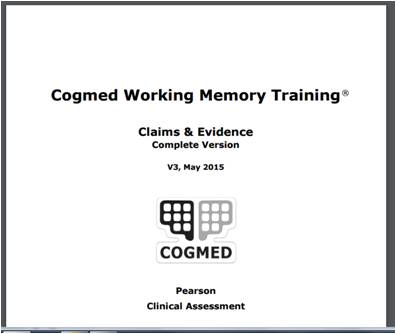Cogmed Claims Validated - Improve Memory
Research overwhelmingly supports the benefits of the Cogmed Program
Working memory is a key cognitive function used in daily life that allows individuals to hold information “online” for brief periods of time, in order to complete tasks. It provides a workspace while we mentally engage in other relevant activities. Working memory is the ability to control attention in the face of distractions. A poor working memory is a bottleneck to learning.
Dr. Allan Badderly defined working memory as a multi-faceted function that captures visual and auditory information, directs attention, and coordinates processes. Scientific research demonstrates that working memory is one of our most critical cognitive capabilities, essential for many daily activities such as sustaining attention, following directions, carrying out multistep instructions, remembering information, staying focused, comprehension reading, writing, reasoning mathematically and complex reasoning.
In 1999, Torkel Klingberg began research on developing a program that would improve working memory and attention at the Karolinska Institute in Stockholm, Sweden. After eight years of research the Cogmed Program was launched in the United States. After reviewing the research as well as embracing the research on brain plasticity, The Tarnow Center took a huge leap and became one of Cogmed’s first providers. At that time many other professionals in the community doubted its effectiveness and were quite skeptical of the program.
Nine years later the research overwhelmingly supports the benefits of doing the Cogmed Program. As of May, 2015, there have been more than 55 peer-reviewed publications and studies. The high standards and quality of this research clearly validates Cogmed’s claims to improve learning, functional brain activity, attention, and daily life functioning. The findings repeatedly reported theses results in children and adults with ADHD, learning difficulties, brain injury, language disorders, and stroke/traumatic brain injury.
CLICK HERE FOR COGMED'S 2015 CLAIMS AND EVIDENCE
